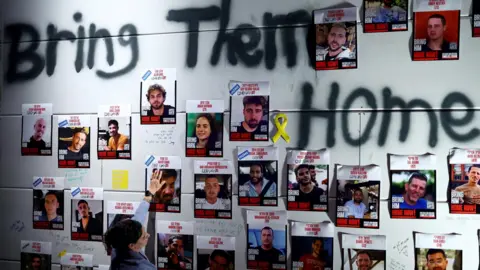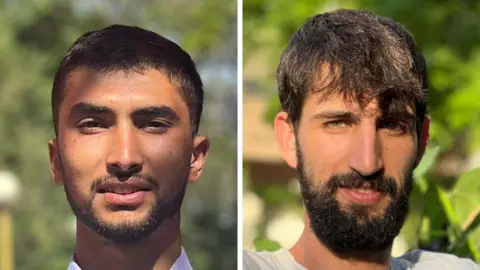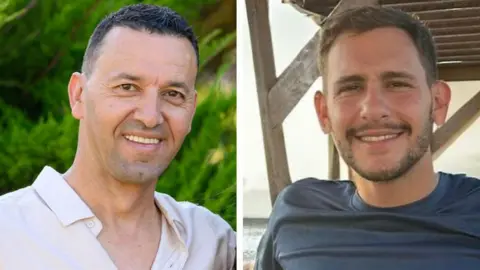David Gretten and
Rushdi Abu AlofGaza Istanbul correspondent
 Reuters
ReutersIsrael identified the bodies of the four deceased hostages returned by Hamas on Monday as part of the Gaza ceasefire agreement.
On Tuesday morning, the Israeli army announced the names of two hostages, Guy Illouz, a 26-year-old Israeli, and Bipin Joshi, a 23-year-old Nepalese citizen.
Later, the families of the other two hostages identified them as Yossi Sharabi, a 53-year-old Israeli, and Daniel Peretz, 22, a dual Israeli-South African citizen.
Meanwhile, Israeli officials said the government would restrict aid entry into Gaza and delay the reopening of the Rafah border crossing with Egypt due to Hamas’ failure to hand over the bodies of the other 24 hostages killed on Monday.
The Israeli Defense Minister said, “Any delay or deliberate avoidance will be considered a flagrant violation of the agreement and will be responded to accordingly.”
Hamas said it may take some time because not all hostage burial sites are known.
The Palestinian armed movement released the remaining 20 hostages alive on Monday in exchange for the release of nearly 2,000 Palestinian prisoners and detainees in Israeli prisons.
The IDF said Tuesday morning that after forensic examinations, representatives of the families of Guy Illuz, Bipin Joshi and two other hostages were informed that they had been returned to Israel for burial.
Illuz, a sound technician in the Israeli music industry from the central Israeli town of Raanana, was “wounded and kidnapped alive” by Hamas gunmen after surviving the attack on the Nova music festival on October 7, 2023, the Israeli military said.
She added, “The man died of his wounds after he did not receive appropriate medical treatment while being held by Hamas.”
The Forum for Hostages and Missing Families in Israel quoted the released hostage, Maya Regev, as saying that Illuz “was kidnapped unconscious and remained alone for a whole week, tied to his bed.”
“A day and a half before he died, she was brought to his hospital room, where he told her that his mother was the strongest woman in the world, and that the moment he returned home he would hug her and never let go.”
Bipin Joshi was an agriculture student who had only been in Israel for a few weeks when Kibbutz Alumim was attacked by Hamas gunmen two years ago.
According to the Hostage Families Forum, he “escaped to a shelter on the kibbutz with other foreign students, He blocked a live bomb with his bare handsWith his courage, he saved many lives.”
The Israeli military said it estimated that Joshi “was killed in captivity during the first months of the war.”
 Forum for hostages and families of missing persons
Forum for hostages and families of missing personsThe Hostage Families Forum said on Tuesday evening in a statement that it embraced the families of Daniel Peretz and Yossi Sharabi after they “returned to Israel yesterday to give them a proper burial.”
Yossi Sharabi was kidnapped from his home on Kibbutz Be’eri on October 7 along with his brother Eli, whose British-Israeli wife and two daughters were killed.
Last year, the Israeli military said an investigation found that Yossi was likely killed when a building collapsed following an Israeli raid on another building nearby.
Hamas released Eli in February 2025 during the last ceasefire agreement.
Daniel Peretz, who immigrated from South Africa to Israel when he was 13 and lived in the central Israeli town of Yad Binyamin, was a captain in the IDF’s 7th Armored Brigade.
The Israeli army said last year that he was killed in an attack on his tank near Nahal Oz on October 7 and his body was taken to Gaza as a hostage.
The Israeli army said that final conclusions about the death of the two men will be determined after forensic examinations are conducted.
The Hostage Families Forum said the return of their bodies “brings a measure of comfort to families who have lived in a state of painful uncertainty and doubt for more than two years.”
She added, “We will not rest until all 24 hostages are returned to their homeland.”
The IDF expressed its condolences to their families and pledged to continue making every effort to return the remains of the hostages in line with the ceasefire agreement.
It warned that “Hamas is required to implement its agreement and make the necessary efforts to return all hostages to their families and bury them properly.”
Later, Israeli officials told Reuters news agency that the Israeli authorities decided to keep the Rafah border crossing between Gaza and Egypt closed and reduce humanitarian aid shipments to the Strip until all bodies are returned.
Tom Fletcher, the UN humanitarian coordinator, told the BBC that Hamas should “bring the bodies home, as promised”, but Israel should also keep the crossings into Gaza open so that “much-needed” aid can be delivered.
 Forum for hostages and families of missing persons
Forum for hostages and families of missing personsHamas has not yet issued a statement explaining the delay, but a senior Palestinian source told the BBC on Tuesday that the movement’s negotiators are meeting with mediators in Egypt to try to resolve the issue.
According to Hamas officials, some hostage bodies are still trapped under the rubble of buildings destroyed by Israeli bombing and demolitions, and the group has requested the entry of heavy machinery to assist in recovery efforts.
A copy of the ceasefire agreement published by Israeli media last week appeared to acknowledge that Hamas and other Palestinian groups may not be able to locate all the bodies before the deadline of 12:00 local time (09:00) on Monday.
A mechanism was established between the two sides through mediators and the Red Cross, allowing them to exchange information and intelligence about the locations of the remains of any deceased hostages who were not recovered before the deadline.
The Red Cross warned on Tuesday that the search could take days or weeks.
“It is clear that searching for human remains represents a greater challenge than releasing living people,” Christian Cardon, spokesman for the organization, told reporters in Geneva.
“I think there is a clear risk that this will take much longer. What we are saying to the parties is that this must be their top priority,” he added.
Separately, Nasser Hospital in southern Gaza said it received the remains of 45 Palestinians detained by Israel on Tuesday.
There was no announcement from the Israeli authorities, but the ceasefire agreement stipulates the exchange of the bodies of 15 Palestinians for every dead Israeli hostage.
Fears are growing among Palestinians that the delay in returning the hostages’ bodies will derail the ceasefire.
Tayseer Abed, a well-known writer who recorded the war from his tent in the southern city of Khan Yunis, described the war as a “dangerous test.”
He warned that if the delay continues and Israel refuses to move to the next phase of Donald Trump’s peace plan for Gaza, “the issue of bodies could become the fuse that ignites a new round of conflict.”
Palestinians also expressed concern about the continuing deadly violence in Gaza.
On Tuesday, paramedics and paramedics said Israeli drone fire killed five Palestinians as they headed to inspect homes in the Shujaiya neighborhood east of Gaza City.
They added that another person was killed in an Israeli raid east of Khan Yunis.
The Israeli military said it opened fire on the suspects who were “identified as crossing the yellow line” — the withdrawal line inside Gaza agreed upon in the ceasefire agreement — and who approached its forces in a threatening manner.
A Hamas spokesman accused the Israeli army of violating the ceasefire.
The Israeli military launched a campaign in Gaza in response to the Hamas-led attack on southern Israel on October 7, 2023, in which approximately 1,200 people were killed and 251 others were taken hostage.
At least 67,913 people have been killed in Israeli military operations in Gaza since then, according to the Hamas-run Health Ministry in the Strip.
https://ichef.bbci.co.uk/news/1024/branded_news/8bcd/live/c3bc7820-a928-11f0-928c-71dbb8619e94.jpg
Source link
